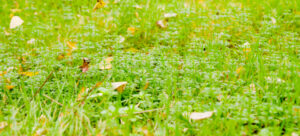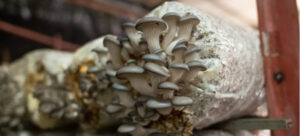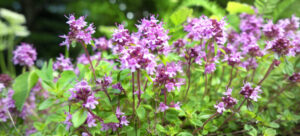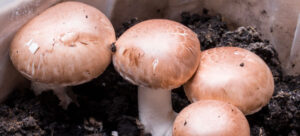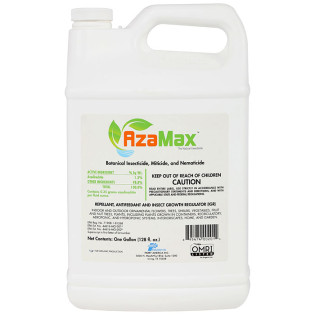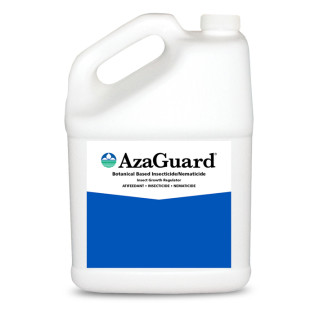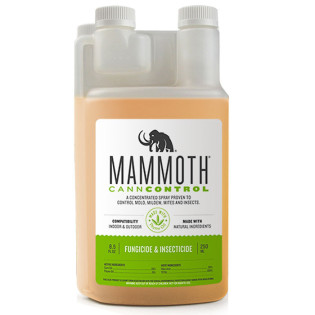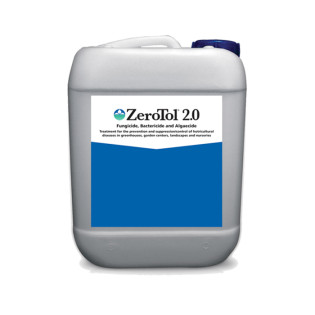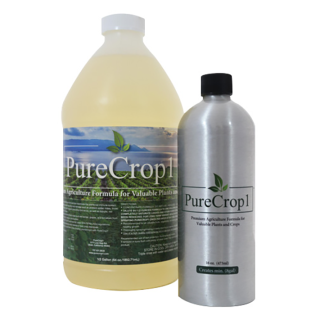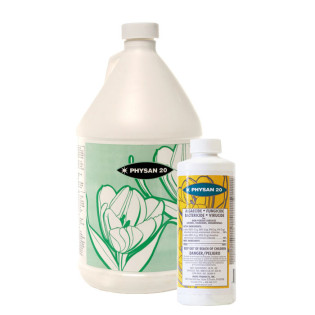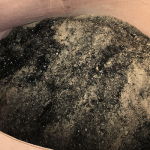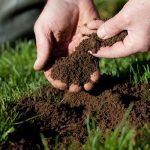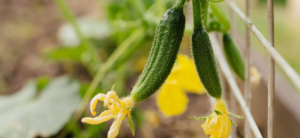
Whether you’re acting preventatively or dealing with an existing outbreak, you need the best garden pesticide & fungicide on hand to keep your plants safe and healthy in a worst case scenario.
While these types of products may have a negative connotation in certain communities, the hate is unwarranted - when used properly, pest & disease control products are entirely safe for you, the environment, and of course, your plants. We’ll cover this more in depth later on.
In this article, you’re also going to learn when & how these types of products should be used, and how you can do so safely.
Of course, we’re also going to cover the main topic of this blog post - the top insecticides & fungicides you can implement in your grow room or garden.
We’ll help you weigh the pros and cons of each product, and consider variables such as plant & bug type, organic vs synthetic, & much more.
Garden Pesticides vs Fungicides
Before we dive into any of the main topics we want to cover today, we want to quickly break down the difference between pesticides & fungicides for our newer growers.
Both of these products can be considered essentials, because they both serve incredibly important purposes. However, they are used to control different types of plant issues. You can easily differentiate between the two just based on their names:
- Pesticides / Insecticides: Active ingredients target & control bugs
- Fungicides: Active ingredients target mold & mildew spores, along with other illnesses
When Should You Use Garden Pesticides & Fungicides?
Even with the best insecticide or fungicide on the market, you’re going to struggle to restore balance within your plants if you don’t use these at the right time.
This takes a good understanding of which specific pest or illness you’re combatting, and determining where the infestation is at in its life cycle.
As an example, there are certain bugs that can be immune to insecticides once they’ve reached their adult stages, so spraying at this point will be ineffective.
You also need to be concerned with whether or not the pest you are spraying has built up a tolerance to chemical products. If you continuously spray and battle the same pest season after season, your previous go-to product will start to render ineffective.
Furthermore, there are certain instances in which these types of pest control products should be avoided.
For example, if you’re preparing for harvest tomorrow, you’ll need to be really careful about what you spray on your plants today.
Sure, there are products that can be applied up to the day of harvest. But most people tend to err on the side of caution, and avoid spraying this close to harvest unless there is no doubt it’s safe.
You also need to keep in mind how the product you’re applying might affect the beneficial bugs taking haven in your garden. If you’ve introduced these types of insects, or they’ve been brought to your garden naturally, you should be careful about spraying anything that could harm them.
A final instance in which you should consider a more organic garden pest control approach is if you have pollinators in your garden, as you could interrupt their natural processes with chemical sprays.
Are Insecticides & Fungicides Safe?
Now, with all that in mind, you are likely wondering if these are truly safe to use. We’ve said it before and we’ll say it again - if you follow manufacturer recommendations & wear proper PPE, there is minimal risk associated with any pest control product you’ll find on our site.

Most of the time experience issues with these products is due to user error.
By simply wearing a mask, eye protection, and gloves, you can protect yourself or whoever is around while actively applying the product to your plants.
And when you dose the product properly and spray it as directed by the manufacturer, you don’t have to worry about harming your plants or the environment (including animals & beneficial bugs/pollinators).
The final concern associated with these products from a safety standpoint is residual chemicals building up within the plant, and then you (or whoever ultimately consumes your plants) ingesting or inhaling those chemicals.
This is a real concern when using certain products, specifically, those with chemicals toxic to humans.
However, most of the active ingredients you’ll find in modern pest & disease control products do not persist long term.
In fact, some of the most common have a half-life of just 1 week, becoming undetectable within days. Just about every product you'll find on this list today leaves behind no residual chemicals in the plant permanently.
Use OMRI Listed Products To Be Safe
We understand that some people still want to take extra precautions when spraying their plants, and rightfully so. In these instances, we would recommend an OMRI listed product.
These are considered organic, tested to the strictest of standards when it comes to organic growing. They do not contain any harmful chemicals or toxins that would compromise the health of you or your plants. On this list, we’ll share a couple of choices that fall under this category.
What To Consider Before Buying The Best Garden Insecticide Or Fungicide
Now, with all that in mind, we’re ready to discuss what you need to consider when shopping for a pesticide or fungicide. It goes without saying that not all of these products are created equal.
Which one is best for one garden might not be best for your garden. Here are the most important things to consider when choosing an insecticide or fungicide for your grow room or garden:
- Plant type - Certain pesticides won’t be as effective on certain plants. So do some extensive research into which products work best for whichever plant you are cultivating.
- Preventative vs infestation control - Recommendations will vary based on whether you’re actively battling a bug or mildew outbreak, or if you’re simply acting preventatively.
- Organic vs synthetic - We just briefly touched on the safety aspect behind these pest & disease control products. Consider how much an organic label matters to you, because to some, it’s a requirement. This is especially true when growing commercially and ultimately selling your product to the masses.
- Bug or fungus type - This is definitely the most important factor you need to consider before investing in your pest/disease control product. There are products specifically engineered to combat certain problems. So if you know the specific bug or fungus giving you grief, you can easily find a product tailored to that issue! Pay attention to the active ingredients.
Criteria For Choosing The Best Garden Pesticide or Fungicide
With that said, we are almost ready to help you choose the best garden insecticide or fungicide for your plants. We just want to quickly share the criteria we used when determining our selections.
- Brand reputation
- Active ingredients
- Effectiveness
- Safety (no residuals left in plant long term)
- Price
All of these things matter when dictating which pesticide & fungicide is best for your garden, but some of these factors may be more important to you than the rest.
So, we encourage you to read carefully as we outline which pesticides are best for which instances!
What Is The Best Garden Pesticide Of 2023?

We’re going to start with some selections for the best garden pesticide of 2023, and we’ll cover fungicides in depth later on. We are going to break up our selections into the following categories:
- Best General Insecticide
- Best Organic Insecticide
- Best Insecticide By Bug Type
Best General Pesticide: General Hydroponics AzaMax Concentrate
General Hydroponics is one of the most reputable brands in the horticulture industry, producing premium products for every aspect of growing. And, their AzaMax Concentrated Pesticide is our pick when it comes to general use.

If you are just looking to keep a product on hand for when an inevitable infestation occurs, this would be our recommendation.
The way it works is a two-pronged attack: as an antifeedant, preventing bugs from eating (slowly starving them to death), and as an insect growth disruptor (prevents them from maturing, reproducing, etc.).
One of the best parts about using this in your garden is there are no harmful chemicals in the formulation, just food grade ingredients: with the main two being Azadirachtin AS & B. This is actually an OMRI listed product in all 50 states!
For those worried about safety, you can’t go wrong here. In fact, AzaMax is safe for use on your plants up until the day of harvest! It won’t leave any residuals behind on your plants after spraying. And, it can control a myriad of pests, including but not limited to:
- Spider mites
- Thrips
- Fungus gnats
- Aphids
- Whiteflies
- Leaf miners
- Worms & caterpillars
- Beetles
- Leafhoppers
- Scales
- Mealybugs
- Nematodes
Best Organic Pesticide: Marrone Bio Innovations Venerate CG

Venerate® CG advanced bioinsecticide features multiple modes of action and is effective against a wide variety of chewing and sucking insects and mites yet is easy on beneficials. Its unique and novel modes of action will complement and improve integrated pest management and insect resistance management programs.
Venerate CG bioinsecticide can be used in conventional and organic systems as either a ground or air application, maximizing operational efficiencies. With an MRL tolerance exemption, a zero-day pre-harvest interval, and no limit on the number of applications, Venerate CG can help you meet your customers’ desire for residue-free crops and produce.
Pest Control Examples
- Armyworms
- Aphids
- Asian Citrus Psyllid
- Mites
- Spotted Wing Drosophila
- Thrips
- Whiteflies
Best Pesticide For Caterpillars & Worms: Safer Brand Caterpillar Killer

Making back to back appearances, Safer Brand Caterpillar Killer is the obvious go to if you’re dealing with this specific bug.
Not only is this the most effective product for caterpillar infestations, it’s the most economical choice, too. It can also combat different types of worms, including but not limited to:
- Corn earworm
- Hornworms
- Loopers
- Cabbage worm
- Bollworm
- Armyworm
Using a specially engineered form of bacillus thuringiensis, this product kills these creepy crawlers within just a few days after they ingest it.
Whether you’re a hobbyist or commercial grower, this is the product of choice for caterpillar problems.
Best Pesticide For Mites: BioSafe AzaGuard

Spider mites are one of the most notorious garden pest, both indoors and outdoors. But, with BioSafe AzaGuard eradication is simpler than ever.
AzaGuard is a 3% Azadirachtin formulated Insect Growth Regulator (IGR) that offers broad spectrum insecticidal control on over 300 insect species. AzaGuard prevents molting between larval, pupal and nymphal stages reducing insect infestations in and around the facility. AzaGuard's natural botanical formula meets all of the requirements of the National Organic Program (NOP), and is an important tool in Integrated Pest Management (IPM) and sustainable disease control programs.
BioSafe AzaGuard Specs
- Formulation captures over 100 Limonoids Compounds
- Immediately effective on insect larvae
- Anti-feedant, insect growth regulator, ovi–position deterrent
- Target all life stages by tank mixing
- 1+ year shelf life
Best Pesticide For Aphids & Whiteflies: Mammoth Microbes CannControl

Aphids & whiteflies are two of the more troublesome bugs you will encounter, particularly when growing outdoors.
These are very different insects, but they fall under the same category along with quite a few others - soft bodied flying insects.
Mammoth Microbes CannContol is a contact and vapor action fungicide, miticide, and insecticide. CANNCONTROL is made of 100% all natural ingredients, and is compatible for use in indoor and outdoor cultivation.
Our Research and Development team has lab and greenhouse tested this product and proven its effectiveness in preventing and eliminating: Powdery Mildew, Botrytis (Gray Mold), Mites, Aphids, Whiteflies, Thrips, and Fungus Gnats
Like many other products we’ve mentioned thus far, it can be applied up until the day of harvest.
Safe for you, safe for the environment, but detrimental to the frustrating buggers that are munching your plants!
Best Pesticide For Fungus Gnats & Thrips: Sierra Natural Science 203 Pesticide
Fungus gnats & thrips are just as harmful as they are difficult to control - because they’re so small and reproduce so quickly, they’ve become notorious as one of the hardest bugs to eliminate once they’ve colonized.

However, they won’t stand a chance against Sierra Natural Science 203 Pesticide.
High moisture levels in soils and around pots encourage the development of fungus gnats, shore flies and other pests. When this occurs, plants will be stunted with reduced growth and leaf drop. 203 has active ingredients that cause pests to dehydrate and die while also, attacking fungus and algae, reducing the food source for pests. Sierra Natural Science 203 Kills and Repels Fungus Gnats, Root Aphids, Thrips, Shore Flies and Whiteflies.
Sierra Natural Science 203 is made up of 100% pure rosemary & clove botanical extracts highly water soluble. We process raw certified organic botanicals and herbs in-house, ensuring oils and terpenes have a consistent potency across all of our products. The botanical extracts are all food grade GRAS (generally recognized as safe) materials, that are fully biodegradable, and not toxic to animals. It is exempt from EPA registration under minimum risk pesticide exempted under FIFRA section 25(b). It can be used on a wide variety of plants, fruits, and vegetables.
What Is The Best Garden Fungicide Of 2023?
Now, we know a lot of growers struggle with fungal problems too, so we want to cover the best garden fungicide options you have at your disposal.
We’ll break these down similar to our best garden pesticide, offering a multi-purpose solution followed by some recommendations for specific fungal conditions, such as powdery mildew.
Best General Use Fungicide: BioSafe ZeroTol 2.0

If you are a hobbyist or commercial grower looking to keep one product on hand that can effectively control any bacterial, fungal, or algae spores - BioSafe ZeroTol 2.0 is the solution.
It’s OMRI certified for organic use on edibles, ornamentals, turfs, and just about any other plant you can classify.
It uses Hydrogen Dioxide and Peroxyacetic Acid as the two main active ingredients, and can kill the following spores on contact:
- Powdery mildew
- Botrytis (bud rot)
- Phytophthora
- Pythium
The best part about using ZeroTol 2.0 is that no residuals are left behind on your plants, whether you apply the product on the foliage or as a root drench.
Best Fungicide For Powdery Mildew: Athena IPM

Powdery mildew is one of the most frustrating conditions you’ll encounter in your grow room or garden. It can ruin a crop seemingly overnight, forcing you to scrap your grow and start fresh.
But, if you have Athena IPM on hand, you can combat these spores quickly and effectively.
Athena IPM is a complete pest management formula that kills many soft-bodied insects and mildew on contact. When used as directed Athena IPM penetrates plant crevices and leaf surfaces where unwanted biotic infections seek to colonize. Will treat adults, nymphs, larvae and eggs. Kills on contact. Also effective in treating common fungal infections.
- Complete powdery mildew management: Control, Killer & Cure
- 100% Organic microbial exudates (enzymes)
- NO artificial pesticides or fungicides
- Derived from inputs grown in the USA
- Can be used from seedling to harvest
- EPA 25(b) Exempt product with proven safe ingredients
Best Fungicide For Bud Rot: PureCrop1 Fungicide

While powdery mildew is no doubt a terrible condition to encounter, bud rot may take the cake for worst fungal illness - because you’re so close to harvest day, and you’ve encountered the toxic botrytis mold.
Fortunately, if you are able to catch this condition early, you can combat it effectively with PureCrop1 Fungicide, an all purpose plant health stimulator.
It’s OMRI listed, and pulls away the mold spores from the plant when it comes in contact with them. The active ingredients then sterilize the spore, and decompose it, leaving behind a healthy, pure flower - free of bud rot!
It’s formulated from just 7 ingredients, all of which are plant based.
On top of helping you control botrytis, you can eliminate a broad range of pests and other mildews, while increasing plant health and reducing stress.
This is a great product to keep in your arsenal as a proactive approach to pest & disease management, and it can be safely applied with no REI (Re-entry interval) necessary.
Best Fungicide For Root Rot: BioSafe TerraClean 5.0 Fungicide

Root rot is a condition many growers will encounter and write their plants off as “too late to save”.
And while it’s true that some plants can’t be saved once this condition has progressed past a certain point, you can catch the symptoms early and attack the problem using BioSafe TerraClean 5.0 Fungicide.
Formulated with our powerful and stable peroxyacetic acid chemistry, use ZeroTol 2.0 starting at propagation through production to protect crops, including fruits and vegetables. ZeroTol 2.0 is the fire extinguisher for bacterial, fungal, or algal fires, it immediately knocks out harmful organisms that could damage turf, crops and ornamentals. ZeroTol 2.0’s fast-acting oxidation process has broad-spectrum application.
By incorporating ZeroTol 2.0 into an integrated pest program, and using it before pathogen emergence, it creates a more prepared growing operation.
Need Help Choosing The Best Insecticide Or Fungicide For Your Grow?
This exhaustive list has included recommendations for general garden use, along with specific recommendations for the most common garden pests and diseases you’ll come across.
However, we know that you might be dealing with a different bug not mentioned on this list, or you have some special considerations that might prevent you from using one of the products we’ve mentioned.
If you need any more help, a good starting point is our article covering the most common pests and diseases. You can learn all about which specific bug or fungus you’re combatting, and come up with a plan to eradicate it.
And whenever you’re in doubt, don’t hesitate to reach out. Our experts are awaiting your email or phone call to help you restore balance to your grow room or garden, with the know-how you need!
Develop An Integrated Pest Management Strategy
If you want to learn more about keeping your plants healthy, we also recommend you check out our guide on developing an integrated pest management strategy.
This is a holistic approach to keeping your garden healthy through a myriad of different techniques, and a must read for any new or experienced grower!

